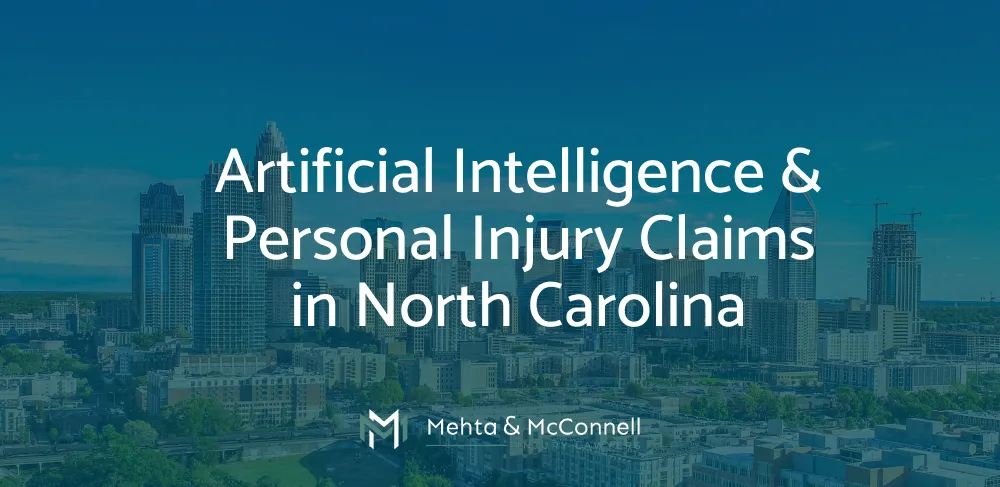 Personal Injury
Personal Injury
In today’s rapidly evolving technological landscape, artificial intelligence is revolutionizing various industries, including the legal sector. Artificial intelligence, often referred to as AI, has emerged as a powerful tool in decision-making processes related to personal injury claims, reshaping how companies handle insurance assessments and personal injury claims. Mehta & McConnell, PLLC stands at the forefront of understanding these developments and navigating the ethical and legal considerations they entail.
Understanding AI in Law
AI encompasses a range of technologies that enable machines to simulate human intelligence and perform tasks that traditionally require human cognition. In the legal sphere, AI algorithms analyze vast amounts of data, extract relevant information, and make predictions or recommendations based on patterns and probabilities.
How is AI Currently Being Used in Law?
Artificial intelligence, with its capacity to analyze vast datasets and identify patterns, has a large potential impact on the legal landscape. Regarding personal injury claims, AI is being harnessed to streamline processes, enhance accuracy, and facilitate more efficient outcomes. Here are some examples of how AI is currently being used in law in North Carolina and nationally.
Legal Research
AI-powered platforms such as ROSS Intelligence and LexisNexis utilize natural language processing algorithms to sift through vast legal databases, helping attorneys find relevant case law, statutes, and precedents efficiently.
Document Review
AI systems can analyze and categorize large volumes of legal documents, including contracts, pleadings, and discovery materials, to identify key information and potential issues, saving significant time and resources for legal professionals.
Predictive Analytics
Machine learning algorithms can analyze historical case data to predict case outcomes, assess the likelihood of success, and identify potential settlement amounts in personal injury claims.
Court Proceedings
At the courthouse, AI technologies play a pivotal role in legal research, document review, and case analysis. Legal professionals leverage AI-powered tools to sift through extensive legal databases, identify relevant case law, and extract key insights to bolster their arguments and decisions.
Contract Analysis
AI tools can review and analyze contracts to identify potential risks, inconsistencies, and compliance issues, facilitating due diligence processes in personal injury cases involving insurance agreements and liability waivers.
AI in Insurance Claims: Enhancing Efficiency or Raising Concerns?
One area where AI is making significant strides is in insurance assessments for personal injury claims. Insurers are increasingly leveraging AI algorithms to evaluate the merits of claims, assess the extent of damages, and calculate fair compensation for injured parties.
For instance, AI-powered software can analyze medical records, accident reports, and other relevant documentation to assess the severity of injuries and predict the likely outcome of litigation. By streamlining the claims process and reducing the potential for human error, AI enables insurers to expedite claims resolution and ensure more equitable results for claimants.
AI systems can also flag suspicious patterns and inconsistencies in claims data, helping insurance companies detect and prevent fraudulent activities, ultimately reducing costs and preserving integrity.
Ethical and Legal Considerations
While the integration of AI in law holds immense promise, it also raises important ethical and legal considerations. As we embrace AI-driven decision-making processes, it is essential to keep these principles in mind.
Transparency and Accountability
A lack of transparency and accountability in algorithms used for decision-making processes for AI in law may raise concerns. Stakeholders may question the fairness and impartiality of AI-generated decisions, particularly if they lack insight into the underlying algorithms and data inputs.
Bias and Fairness
AI systems may inadvertently perpetuate biases present in historical data, leading to disparities in decision-making outcomes, especially in personal injury claims involving marginalized communities. Addressing algorithmic bias requires careful consideration of training data, model design, and ongoing monitoring and evaluation.
Privacy and Data Protection
AI algorithms rely on vast amounts of personal data, including medical records, financial information, and accident reports, raising concerns about privacy breaches and data security vulnerabilities. Ensuring compliance with data protection regulations such as GDPR and HIPAA is essential to safeguarding individuals’ privacy rights.
Legal Liability
Determining legal liability for AI-generated decisions poses complex challenges, particularly in cases where AI systems autonomously make decisions without human intervention. Clarifying the roles and responsibilities of stakeholders, including developers, users, and regulatory authorities, is crucial to allocating legal liability and mitigating potential risks.
Striking a Balance: The Role of Legal Professionals in an AI-Driven Landscape
While AI technologies offer unprecedented opportunities to enhance efficiency and accuracy in decision-making processes related to personal injury claims, they cannot replace the critical judgment, empathy, and ethical reasoning of legal professionals.
Mehta & McConnell Injury Lawyers recognizes the importance of integrating AI tools responsibly, ethically, and in compliance with legal standards to serve the best interests of our clients.
Our Approach to AI in Law for Personal Injury Claims
As we embrace the transformative potential of AI in law, it is incumbent upon us to uphold the highest ethical standards and safeguard the principles of justice and fairness. At Mehta & McConnell, we are committed to harnessing the power of AI responsibly and ethically to advocate for our clients and promote the public good.
Ethical Guidelines
We adhere to strict ethical guidelines and professional standards when utilizing AI technologies in personal injury cases, ensuring transparency, fairness, and accountability in decision-making processes.
Human-Centered Approach
We prioritize the human aspect of legal practice, combining the expertise of our attorneys with the analytical capabilities of AI tools to provide personalized, client-focused representation in personal injury claims.
Continuous Evaluation and Improvement
We recognize the dynamic nature of AI technologies and remain vigilant in evaluating their efficacy, fairness, and ethical implications. We are committed to continuously improving our practices to uphold the highest standards of legal excellence and integrity.
Contact Us
The integration of artificial intelligence into decision-making processes related to personal injury claims presents both opportunities and challenges for the legal profession. By embracing AI responsibly, ethically, and in accordance with legal standards, Mehta & McConnell Injury Lawyers remains committed to advocating for the rights and interests of our clients while navigating the complex intersection of technology and law. If you have a personal injury concern, please contact us to schedule your free case consultation and learn more about how we can help.

